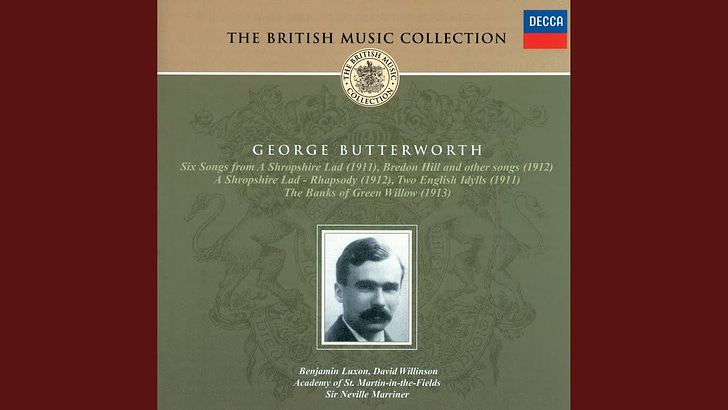Don’s Weekly Listen: Butterworth’s Banks of Green Willow and English Idyll No. 1
The Great War’s toll on European artistic talent is hard to quantify, but one of the biggest musical costs was surely the life of English composer George Butterworth, who was killed in action in the Battle of the Somme at age 31.
Butterworth’s father—like the fathers of too many talented young composers before him—wanted him to become a lawyer, not a composer. But young Butterworth persevered, entering Oxford in 1904 and rising to lead the university’s music club, while forming friendships with several leading lights of the new generation of British music—notably Ralph Vaughan Williams and Adrian Boult.
While at Oxford, he became one of many turn-of-the-century European composers to fall under the spell of his home country’s folk music. As Béla Bartók later would in Eastern Europe, Butterworth began sojourning into the British countryside and recording villagers singing traditional songs. He collected around 450 songs in all, writing some down and recording others on phonograph cylinders.
After graduating Oxford, Butterworth’s work as a music instructor at a boys’ boarding school in Oxfordshire and as a music critic for The Times in London left little time for composition. But the few works he composed during the six years between his graduation in 1908 and his enlistment in the British army in 1914 show the seeds of a civic-oriented compositional genius that even his dear friend and fellow folk music enthusiast Vaughan Williams (whose London Symphony Butterworth apparently inspired) never surpassed.
Butterworth’s voice comes down to us through precious few works, among them four symphonic poems—A Shropshire Lad (based on a song cycle he wrote of the same name), Two English Idylls, and The Banks of Green Willow. Perhaps the best way to get a sense for Butterworth is to spend seven glorious minutes listening to the last of these pieces.
The Banks of Green Willow is nominally based on two folk songs: “The Banks of Green Willow” (an English verse variant for the Scottish folk song “Bonnie Annie”) and “Green Bushes.” We hear the first of these songs in the work’s opening clarinet solo, and the latter in the oboe solo beginning at 3:40.
There are two aspects to this piece that, in my view, elevate it to the level of an orchestral masterwork. The first is its seamless integration of folk music sources in a way that makes them sound as though they were original melodies written for this piece. Each of Butterworth’s developmental ideas springs inexorably out of the source melodies. Witness, for instance, the way he combines the dotted (long-short) rhythm from the second and third notes of “The Banks of Green Willow” with the triplet scale pickup notes in the melody’s final phrase, into a minute-long, intensely personal dramatic build between 2:00 and 3:00.
The word “personal” brings me to the second aspect that distinguishes The Banks of Green Willow from most contemporary English symphonic poems—its feeling of humanity, something I tend to miss in the nostalgic pastoral tableaus of Vaughan Williams and Delius. It’s hard to put a finger on, but when I listen to Vaughan Williams at his best (say, the first movement of the Fifth Symphony or The Lark Ascending), I see an extraordinarily beautiful English country landscape devoid of human life. Butterworth’s music has the same visceral, almost tactile, beauty as Vaughan Williams, but with a human warmth. It might be exactly this, together with the composer’s own story, that has made The Banks of Green Willow into something of an anthem for those young British men who lost their lives in World War I.
Butterworth was non-fatally wounded early in the Battle of the Somme in July 1916, for which he was awarded Britain’s Military Cross. He did not live to receive the decoration, however, since he was killed by a German sniper only three weeks later and buried in the field.
Despite his untimely death and small oeuvre, Butterworth has periodically been discovered and rediscovered over the decades since by some of the world’s most discerning musical palates. None other than Carlos Kleiber, famous (or notorious) for his tiny working repertoire and hardly known as a champion of British music, surprised audiences by programming Butterworth’s English Idyll No. 1 in a 1978 guest appearance with the Chicago Symphony. If it’s good enough for Maestro Kleiber, it’s good enough for us! Here it is, a charming piece in its own right:
A link to The Banks of Green Willow is pasted above.
Enjoy, and have a great week!
DB



